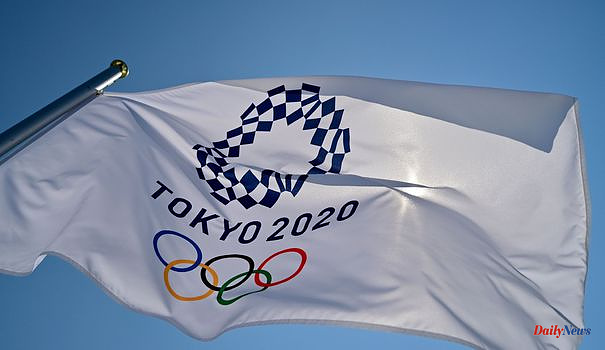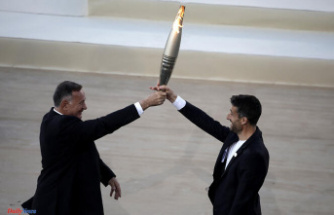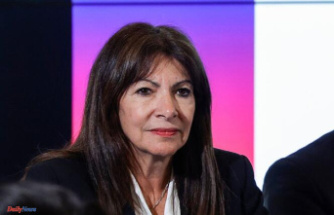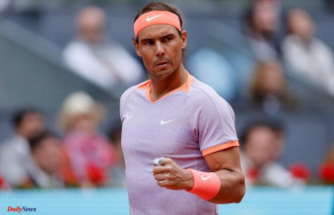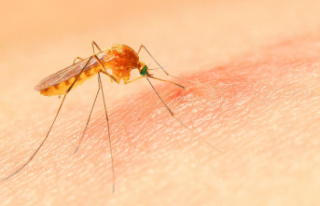The Japanese government decided on Friday to extend the state of emergency in Tokyo and extend it to four other departments, as the health crisis worsens and also affects participants in the Olympic Games, which started a year ago. week. "We have decided to extend the state of emergency in Tokyo and Okinawa (southwest) until August 31," Prime Minister Yoshihide Suga said at a ministerial meeting. The state of emergency will also be declared in Osaka (west) and in three departments bordering Tokyo: Kanawaga, Saitama and Chiba, he added.
Covid-19 cases detected in Japan.
Our World in Data
"The infection is spreading at a speed never reached before", especially in the Greater Tokyo area, noted Yoshihide Suga, while the Delta variant now represents "more than 50% of cases" of Covid-19 in Tokyo, according to Health Minister Norihisa Tamura. "The highly infectious Delta variant is quickly taking over and if the increase (in the number) of infected people does not stop, it is possible that the number of people in serious condition will increase further and hospitals will be overwhelmed", he warned again.
The Japanese capital, under a state of emergency that reduces the opening hours of restaurants and bars and in theory prohibits them from selling alcohol, recorded a new record of new infections on Thursday (3,865), while the number of daily cases nationwide topped 10,000 for the first time. On Friday, 3,300 additional cases were identified in Tokyo.
The "high infectivity" of the Delta variant, summer holidays and the Olympics are all factors driving the rise in cases, Shigeru Omi, a former senior World Health Organization official, said on Thursday ( WHO). Government spokesman Katsunobu Kato on Wednesday called on his fellow citizens to avoid gatherings and drinking in groups, suggesting that people "watch the Olympics at home".
Percentage of the Japanese population having received at least one dose of vaccine against Covid-19.
Our World in Data
Japan has so far been less affected by the pandemic than many other countries, with just over 15,000 deaths from the coronavirus recorded in the archipelago since its appearance. But vaccination has taken off there more slowly than in other industrialized nations: 27% of the national population has received two doses so far, according to the latest daily government figures.
The organizers of the 2020 Olympic Games in Tokyo reported on Friday 27 new cases in people linked to the event - members of the management, auxiliary staff of the Olympic Games or even journalists -, including three athletes, the daily figure on higher to date. This brings the total number of cases reported this month to 225, of which 98 came from abroad. This daily census does not take into account the cases reported at airports and in the base camps of the delegations. According to Games organizers, around 39,800 people in total arrived in Japan for the event.
On Thursday, the director of communications for the International Olympic Committee (IOC) Mark Adams, however, defended the effectiveness of the "countermeasures" put in place against Covid-19 for the Games, which take place behind closed doors and with many restrictions for all participants. The IOC disputes any possible link between the holding of the Olympic Games and the current resurgence of the pandemic in Japan, which had started at the end of June. Haruo Ozaki, president of the Tokyo Medical Association, said the Olympics had an "indirect impact" on the curve of infections in Tokyo, because this sports "party" would encourage people to let their guard down, according to him. .
All athletes who came to Japan to participate in the Tokyo Olympics which opened a week ago are tested daily and if they test positive, they must isolate themselves or be hospitalized. Some athletes who test positive complain of quarantine conditions, often describing what they consider to be "a prison". Tested positive for Covid-19, placed in quarantine in a hotel and deprived of competition in Tokyo, Dutch sportswomen thus expressed their great frustration on Wednesday, denouncing what they described as "Olympic prison", and demanded more time to the open air.
Cloistered each in their rooms, the Dutch can only go out to look for their meal, which is "the same every day", complained Reshmie Oogink. The taekwondo player posted a video on Instagram showing what looks like a scarecrow sitting on a bed and made from her belongings and sports equipment. "New inmate in Olympic prison," she quipped in the caption of the video where she said, "I have a new friend, named Bob. He's ready to fight." On Tuesday, the Dutch Olympic organization had already castigated the “unacceptable” isolation conditions of six members of its delegation in Tokyo, locked in “very small rooms” without ventilation or daylight.

